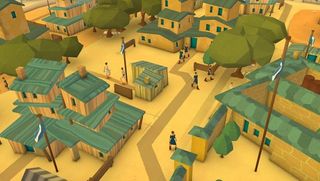F*cking around and oppressing the gingers: Peter Molyneux talks Godus
“If I were to give you the mouse, I think… Everyone who’s played it, they can’t help just tweaking. Which is just lovely. And it’s something that I think that’s slightly missing from games at the moment. But then I suppose there is Minecraft. And there is some inspiration from Minecraft in here”
So while Godus is built around a model focused upon compulsive ease of use--it can be played entirely with a mouse, by way of instinctive, tactile interactions with the player’s Homeworld and its people--its entirely simulated, dynamic world will react directly to the player’s actions. Those reactions could come by more overt means, such as redirected rivers and lakes quickly changing the verdancy of farm land, or they could stem from the more subtle, personal reactions of that land’s inhabitants. The responsibilities of running Godus’ world sound to be as much emotional as logistical, with your people quietly developing their own ways of life based on lessons you might not even realise you’ve taught.

“…sometimes they’ll do things and believe in things you perhaps don’t want them to believe in”, says Molyneux. “For example, because I‘ve been playing this so much, they’ve said it’s sinful to rest. ‘Work is for the righteous’. And because I don’t really care about the land, the trees and all that, they think that the resources of the land can be reaped. All of this stuff, as is one of the charms of the game, is realising that this is exposing who you are and what sort of player you are. Your commandments will be different to mine.
“But everything has got a consequence to it. With the size of the houses you build, you’re creating a class structure. If you build houses really high up, they’re deemed by the followers to be more prestigious. And so if you build high up, the houses below will become slums”
And the knock-on effects can quickly become very practical problems…
“You may well find that if you do that too much, then these people down here may well say ‘Well we don’t want to live down here’. They’ll pack up everything and move out, and suddenly you’ll have about 500 people all waiting to be housed. The number of people you can have in this world is amazing.”

So Godus is adding another level of responsibility, by allowing the infallible word of God to be made fallible by the interpretations of mortals?
Sign up to the GamesRadar+ Newsletter
Weekly digests, tales from the communities you love, and more
“Exactly, that’s right. And remember, you’re creating a civilisation, so the things that you do--just like us now, we still have the Ten Commandments, but they were created 2000 years ago--what you’re doing is creating the fundaments of your civilisation overall”
In-keeping with this more human approach to a genre often built around detached micro-management, there’s a hint of Fable’s eccentric humour here too. The Finger of God ‘weapon’, used to brutally remodel homes and smite enemies alike, is a literal Monty Pythonesque finger, plunging down to wreak fleshy vengeance from the sky. Similarly, the appearance of ‘special’ followers, winnable in both structured story missions and multiplayer conflict, can bring a pleasing dash of silliness depending on how you choose to use their unique attributes. For instance, the follower whose special X-Men power is simply being ginger.
And create a ghetto?
“And create a ghetto”
Or an elitist ginger utopia?
“Or an elitist utopia, and I love that idea that, without you realising it, you’re being selective.”
So then. Simple interactions, weighty consequences, emotional fallouts, and the potential for all manner of silly, player-made jokes about grand ginger empires or the cultural oppression of the carrot-top. Looking back at his output over the last couple of decades, it rather strikes me that despite the (relative) lack of fanfare we come to expect from his projects, in terms of raw ingredients, perhaps Godus might be the most Peter Molyneux game that Peter Molyneux has made in years.
Freed from the arcane rule of the Microsoft Chair Police, it seems like Peter Molyneux, The Man Who Develops Games, is having a lot more fun quietly tinkering with his backlog of ideas than he did while loudly pushing the Next Big One. And the results of that tinkering are currently looking like they could be quite enjoyable too.

Final Fantasy 7 Remake and Rebirth battle director says combining everything he learned on Monster Hunter: World with Square Enix's technology and unique skills created a "chemical reaction"

"Minutes after Palworld released," Pocketpair was already getting game pitches from "some really big names" before it even set up its own publisher: "No one has money at the moment"











